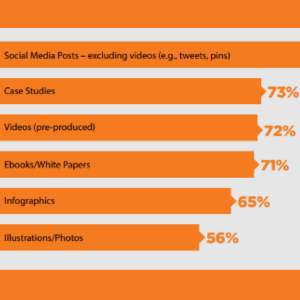The ability to provide insightful solutions and thought leadership is a must for content marketing for B2B. So in order to effectively communicate with the target audience. It makes complex products and services easier to understand. It helps potential customers make decisions, and eventually encourages conversions.
Content marketing helps B2B businesses differentiate themselves in a competitive market. That showcase their unique value propositions. Businesses who prioritize, develop, and prioritize content marketing are better equipped to not just survive. But also thrive in the dynamic world of B2B interactions.
A Contrast of B2B and B2C Content Marketing

It would be unfair to compare B2B and B2C content marketing equally. Even though they are considered fruits, their tastes vary. Variations in content marketing can mainly be seen in the target audience. Utilizing corporate jargon and catering to their specific requirements.
It seems to be a dialogue regarding recent market shifts between two experts. It is most similar to chatting with a friend about your favourite hobbies.
These alterations requires customizing not only the content but also the tone and style for the target audience. Unlike B2C content, B2B content is often more complex, technical, and fact-driven, requiring a higher level of expertise and providing detailed information. Understanding these differences is crucial for marketing professionals to develop successful content strategies.
The Development of Business-to-Business Content Marketing

The rise of business-to-business (B2B) content marketing is likened to witnessing a caterpillar evolve into a butterfly. Beginning with simple sales pitches and using technical jargon resembling a product manual. However, as time passed, businesses came to understand that their customers needed more than just data. Furthermore, they sought useful guidance and solutions to their problems.
Organizations suddenly start the developing interesting blogs, thought-provoking whitepapers, and attractive films to share their information. It seems like businesses has shifted from talking at others to talking with them, showing a genuine interest in their competitors’ success.
The rapid growth of social media and digital platforms sped up this change through allowing for faster and more personalized connections. At present, B2B content marketing is a flourishing, ever-changing industry that molds itself to cater to the preferences of its audience.
Merely selling a product or service is no longer enough.This advancement highlights the importance of adjusting and listening to clients’ needs. It push the B2B content marketing into a new era of cooperation and creativity.
Types of Content Marketing for B2B

This part looks at the different types of content that B2B marketers can utilize to connect with their desired audience.Blog posts are written articles that offer relevant information, perspectives, or updates on the industry or business.
Whitepapers provide details examinations of particular subjects. It often supports the data and studies. In-depth analyses of how a specific company has been successful in using a product or service to show real-world benefits.
Infographics are graphical representations of data or information that assist individuals in comprehending intricate ideas.Videos are audio-visual content pieces that can vary from showing products in action to providing instructional guidanc.

Creating top-notch Content
Quantity and quality are essential factors in content production.This section delves into the creation of unique content. Using data and research to inform content is crucial for delivering trustworthy and valuable information.
As stories can captivate an audience and evoke emotions, businesses use storytelling techniques to make their content more engaging and relatable.Using expertise and data from the industry to create content that promotes confidence and reliability.
How to Determine the B2B Audience

Identify your focus based on the industry they work in (such as technology, finance, or healthcare). Categorizing companies as either large corporations or small and medium-sized enterprises (SMEs) depending on their scale. However Geographic Audience Segmentation is significantly important in international B2B marketing.
Target Audience
Audience target: Personas develops and creates the detail profiles of fictional, yet typical individuals from the target audience .In it include the names, occupations, and personality traits.
Personalizing content: Adapting material to the individual needs, interests, and preferences of each client persona.
How to Gather Audience Information
Surveys & Questionnaires: Obtaining information and feedback from current and prospective B2B customers achieve through carefully design the surveys.
Interviews: Engaging in thorough interviews with key stakeholders to gain a deeper insight into the needs of target organizations.
Analytics and Data Analysis: Utilize analytics and data analysis, you can discover audience trends and preferences that examining website traffic and user interaction data. Examination of content tactics involves using rivals to target the same viewers for the purpose of recognising potential prospects and deficiencies.

Future developments and directions of business-to-business content marketing.Interactive tools such as quizzes, assessments, and calculators uses more frequently B2B marketers to actively involve and inform their target audience.
Utilizing AI tools to customize content, improve suggestions, and streamline certain marketing tasks.Voice Search Optimization involves shifting B2B content towards a more conversational and long-tail focus to accommodate the increasing use of voice-activated devices.The themes of sustainability and CSR are changing due to B2B buyers’ increasing focus on environmentally and socially responsible business practices.
Getting Ready for the Future
Utilizing chatbots, predictive analytics, and content personalization to improve consumer experiences exemplifies the utilization of AI.
By including diversity and inclusion in content creation, a broader audience can be reached and societal norms can be better represented.By employing responsive design, the main goal is to provide smooth and enjoyable content experiences through user-friendly interfaces.
Challenges and Solutions

Limited resources: Time, workforce, or financial constraints are common obstacles for B2B companies when creating content.
Complicated Subjects: B2B sectors may involve complex or technical topics that can be difficult to communicate to a broader audience.
Lengthy sales processes: B2B sales may include more intentional stages, necessitating ongoing engagement with potential customers.
Competition: Standing out and capturing the audience’s attention in B2B sectors can be difficult because of fierce rivalry.
Strategies for Surmounting Obstacles
Resource allocation: Allocate resources based on need, prioritizing high-impact materials.
Making Complex Topics: Making complex topics easier to understand by utilizing effective storytelling, images, and examples.
Track ROI: Use advanced analytics tools to figure out the exact influence of content marketing on sales and conversions.
SEO and B2B Content

Basic Principles of Search Engine Optimization (SEO) for B2B Content
This section covers the fundamentals of SEO for B2B content marketing. Therefore, it is crucial to choose appropriate search terms that potential B2B clients could utilize to discover your content. Off-Page SEO involves strategies to enhance your website’s reputation and credibility on the internet, often by obtaining backlinks from trustworthy sites.
Discovering highly pertinent keywords: How to identify keywords that align with the search inquiries of your target market and are extremely relevant to your B2B offerings.
Improving content: Examples of on-page SEO strategies include utilizing header tags, generating SEO-friendly URLs, and ensuring a website is compatible with mobile devices.
Off-Page SEO Strategies: Increase your website’s authority by engaging in social networks, building links, and submitting guest posts to create a strong online presence.
FAQ’s
What makes content marketing for businesses different from that for consumers?
The main distinction between B2B and B2C content marketing is examined in this inquiry.The main distinction lies in the targeted audience. The B2B content marketing target audience consists of both businesses and individuals, aiming to offer tailored information and solutions that meet their specific needs.
What techniques can B2B businesses use to pinpoint their perfect clientele?
The approaches used to determine and categorise the target market for business-to-business content marketing are the main focus of the inquiry. Analysing and categorising the audience according to variables like business size, region, industry segmentation, and demographics is crucial.
Which content types are the main ones used in business-to-business marketing?
This investigation explores the various types of content frequently utilized in B2B marketing. Whitepapers, case studies, infographics, videos, and blog posts represent some of the crucial content types featured. B2B marketers can select the most suitable content formats in order to convey their message and capture the interest of their audience, by recognizing the various options at their disposal.
What impact does SEO have on B2B content marketing?
This study investigates the relationship between SEO and B2B content marketing. It is highlighted how crucial SEO is for increasing the exposure of B2B content in search engine results. Three SEO tactics that work well include keyword research, on-page optimisation, and off-page optimisation.
What typical difficulties do B2B content marketers encounter?
This question delves into the common issue faced by B2B content marketers. It discusses handling difficult subjects, dealing with long sales processes, overcoming strong competition, and assessing the success of content marketing campaigns in terms of ROI.

